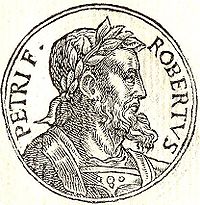Robert de Courtenay
| Robert I | |
|---|---|
 |
|
| Latin Emperor of Constantinople | |
| Reign | 25 March 1221 – 1228 |
| Predecessor | Peter |
| Successor | Baldwin II |
| Died | 1228 |
| Spouse | Lady of Neuville |
| House | House of Courtenay |
| Father | Peter |
| Mother | Yolanda of Flanders |
Robert I, also Robert of Courtenay (died 1228), Latin Emperor of Constantinople, was a younger son of the emperor Peter II of Courtenay, and Yolanda of Flanders.
When it became known in France that Peter of Courtenay was dead, his eldest son, Philip, Marquis of Namur, renounced the succession to the Latin empire of Constantinople in favor of his brother Robert, who set out to take possession of his distracted inheritance. Crowned emperor on March 25, 1221, Robert's first loss was Thessalonica in 1224 to Theodore Doukas of Epiros. Worried about the situation of the Catholic Latin Empire, pope Honorius III called for a crusade for the defense of Thessalonica, but the response was ineffective. In the same year, Robert's empire would suffer another defeat to John Ducas Vatatzes at the Battle of Poimanenos.
Following this defeat Robert was compelled to make peace with his chief foe, John III Ducas Vatatzes, emperor of Nicaea, who was confirmed in all his conquests. Robert promised to marry Eudoxia, daughter of the late emperor of Nicaea, Theodore I Lascaris and Anna Angelina. He had been betrothed to Eudoxia on a former occasion; the circumstances surrounding the failed negotiations are unclear, but George Akropolites states that the arrangement was blocked on religious grounds by the Orthodox Patriarch Manuel Sarantenos: Robert's sister Marie de Courtenay was married to Emperor Theodore I Laskaris. Accordingly, Robert, already Theodore's brother-in-law, could not also be his son-in-law. Regardless, Robert soon repudiated this engagement, and married the Lady of Neuville, already the fiancée of a Burgundian gentleman. Heading a conspiracy, the Burgundian drove Robert from Constantinople, he fled to Rome to seek redress from the pope who convinced him to return to Constantinople, but on his return trip, in early in 1228, the emperor died in Morea.
...
Wikipedia
